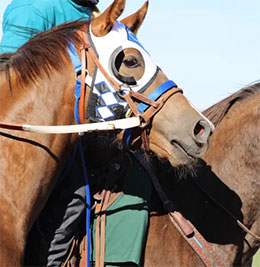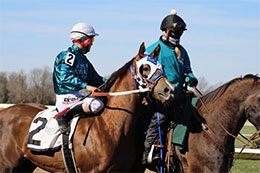- News
- Horse Racing
- Racing Preview
- AQHA Racing Challenge
- Breeding
- Sales
- Quick Stakes Results
- Detail Race Results
- Qualifiers
- Leader Board
- Leading Sires
- Videos
- Auction Leaders
- Q-Racing
Streaming Video
© JD Deering Photo

By Natalie Voss, PaulickReport
It's not something you see every day, but this 3-year-old racing Quarter Horse filly is happier without a bit, her breeder says.
Eagle-eyed observers at the recently-concluded Sandy Ridge Quarter Horse meet in Lexington, Ky., may have noticed something different when they looked at 3-year-old Dirti Dianne. The Clint Crawford trainee competed twice at the meet (held at the Red Mile) in a bitless bridle.
Though they're not all that common in the racing world, bitless bridles of various styles are popular in other equestrian sports. The style worn by Dirti Dianne is a sidepull, in which reins attach to rings on either side of the noseband at the corners of the mouth in absence of a bit. Sidepulls also feature two straps running from the noseband to the cheekpiece for a more precise fit and dispersal of pressure from the reins.
Some horses respond better to bitless than bitted bridles, while others find the direct application of pressure or tension from the reins to the face too overstimulating.
Renee Wilson, co-breeder of Dirti Dianne, said she has tried sidepulls with a few of her runners and in some cases it has been a huge asset.
"I used to barrel race a little bit and I like a hackamore on a horse, especially one that's kind of sensitive-mouthed," said Wilson. (Hackamore is an all-encompassing term that includes both nosebands and leverage attachments to bridles, as well as bitless headstalls like a sidepull.) "You take the bit out and you've got more control with their nose and their face."
 Dirti Dianne makes her way to the post at the Sandy Ridge at Red Mile meeting in March 2024 wearing a sidepull bitless bridle. © JD Deering Photo
Dirti Dianne makes her way to the post at the Sandy Ridge at Red Mile meeting in March 2024 wearing a sidepull bitless bridle. © JD Deering Photo In the case of Dirti Dianne, Wilson said the filly had an injury to her face as a foal that left her anxious about activity around her nose and mouth.
"When we were breaking her, whenever you'd touch the bit or bridle to pick her up, she'd just be overstimulated," said Wilson. "We put the sidepull on her and she went right to work. All the fighting and issues we were having were completely gone. So she was broke completely in that sidepull hackamore. She's never had a problem with going left or right or ducking in or out. We got her approved that way in her workouts to race and that's how she's been ever since."
Despite her challenges, Dianne is beloved in the barn. She's trained by Clint Crawford (Wilson's partner and co-breeder of the horse) and owned by Clint's father, Kenneth, so has stayed in the family. Although she's by a Quarter horse (Candy Tree Dynasty), Dianne is out of Storm Boot mare Arctic Winter, a Thoroughbred sprinter.
Dianne isn't the only horse Wilson has tried in a sidepull. Wilson recalled C R Smoke, who was especially sensitive to bit pressure out of the gate. After cycling through ten different bit types, Crawford and rider Omar Reyes agreed to try the sidepull despite their skepticism. That proved a night and day turnaround and the filly won her trial for the 2018 Oklahoma Futurity soon after the addition.
"That made believers out of them," she chuckled. "We had one guy claim a horse off of us and I love the horses so much I said, 'Listen, this is what you need to keep him being successful. You put a bit in his mouth, and he's going to want to rear up, he's not going to leave the gates.' I gave him the bridle to go with the horse. I've had a few other people call and ask about it, and want to try it on their horses.
Wilson said she prefers horses and jockeys to have experienced the sidepull in workouts before they go to the starting gates, so that everyone knows what to expect. The rider will need a lighter touch both for stopping and turning and the horse should get to experience the difference in feel before going full speed. She has not encountered any state regulations that address bits versus no bits, and part of the purpose in working a horse in the bridle is also so that when they go to the gate, racing officials can be assured the equipment isn't a change from the horse's previous recorded activity.
"I love the racehorses, but I'm one of those people who wants to learn from everybody, whether it's dressage, hunter/jumpers, team ropers, and I've always taken that into account," Wilson said. "With racehorses, people get into this one-track mind of what works and what doesn't work. I think every horse is different, and you have to think outside the box about what's right for that individual."
Reprinted courtesy Paulick Report. Natalie Voss is the editor-in-chief.

 Newsletters
Newsletters Facebook
Facebook